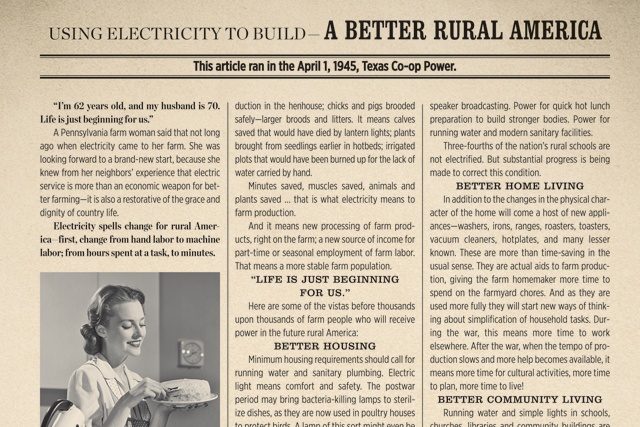I
’m 62 years old, and my husband is 70. Life is just beginning for us.”
A Pennsylvania farm woman said that not long ago when electricity came to her farm. She was looking forward to a brand-new start, because she knew from her neighbors’ experience that electric service is more than an economic weapon for better farming—it is also a restorative of the grace and dignity of country life.
Electricity spells change for rural America—first, change from hand labor to machine labor; from hours spent at a task, to minutes.
Better Use of Labor
Electricity means a young girl can do the milking by machine, instead of two men doing it by hand; a pump to supply water for a herd of cattle, instead of a pair of brawny, but tiring shoulders; a motor to elevate and grind grain, run a grindstone, churn milk, hoist hay, saw wood.
Better Use of Time
It means 3-minute milking per cow; it means a woodpile lowered in half an hour; ensilage chopped and stored in an hour; milk separated in 20 minutes; a garden watered in an hour. And time saved means time earned. Lights in the barn mean a farmer can work two hours longer in the field. That means more acres farmed.
More Production
Electricity means lights for higher seasonal production in the henhouse; chicks and pigs brooded safely—larger broods and litters. It means calves saved that would have died by lantern lights; plants brought from seedlings earlier in hotbeds; irrigated plots that would have been burned up for the lack of water carried by hand.
Minutes saved, muscles saved, animals and plants saved … that is what electricity means to farm production.
And it means new processing of farm products, right on the farm; a new source of income for part-time or seasonal employment of farm labor. That means a more stable farm population.
“Life is just beginning for us.”
Here are some of the vistas before thousands upon thousands of farm people who will receive power in the future rural America:
Better Housing
Minimum housing requirements should call for running water and sanitary plumbing. Electric light means comfort and safety. The postwar period may bring bacteria-killing lamps to sterilize dishes, as they are now used in poultry houses to protect birds. A lamp of this sort might even be inserted in a water pipe to kill waterborne germs. Air cleansing and cooling devices for rooms are on the way. So is electrical heating. For rural homes as well as city homes, television and improved radios are postwar likelihoods. And improved kitchen facilities bring in their train bright new floor covering, new cabinets, paint and wallpaper.
Better Nutrition
Better-balanced, more nourishing meals can follow in the wake of electric service. A refrigerator saves large amounts of food for a family every year. After the war, a farm family will be able to buy a small mill for grinding the grain it raises into the flour it uses … a better, richer flour.
Irrigation helps to grow better and more vegetables in the kitchen garden, and a refrigerator preserves their vitamin content for short periods. Quick-freezing and dehydration for longer-term storage will retain the highest possible degree of nutritive value, and guarantee a shift from fresh meat only at butchering time and fresh vegetables at picking time, to a better-balanced diet the year round.
Better Schools
Electricity means more than better light for better sight, important as that is. It means power for motion pictures and slide films, war-proved educational tools of first magnitude. Power for vocational shops and domestic science laboratories and kitchens. Power for radio and loudspeaker broadcasting. Power for quick hot lunch preparation to build stronger bodies. Power for running water and modern sanitary facilities.
Three-fourths of the nation’s rural schools are not electrified. But substantial progress is being made to correct this condition.
Better Home Living
In addition to the changes in the physical character of the home will come a host of new appliances—washers, irons, ranges, roasters, toasters, vacuum cleaners, hotplates, and many lesser known. These are more than time-saving in the usual sense. They are actual aids to farm production, giving the farm homemaker more time to spend on the farmyard chores. And as they are used more fully they will start new ways of thinking about simplification of household tasks. During the war, this means more time to work elsewhere. After the war, when the tempo of production slows and more help becomes available, it means more time for cultural activities, more time to plan, more time to live!
Better Community Living
Running water and simple lights in schools, churches, libraries and community buildings are only a beginning. “Lights” can mean light for stage performances, for motion pictures, for concerts, for ball games, for lectures, for adult education classes of all kinds. It’s up to the community to decide to what use lights are put.
Power can mean better public health facilities—more modern, well-equipped hospitals; more sanitary stores and restaurants, with freezing cabinets and refrigerators, fans and running water; better public establishments of all kinds.
Better Community Development
REA-financed cooperatives’ office buildings, modern in design, have been, and increasingly will be, the center of modern, progressive community development. Two architects recently envisioned (and drew plans for) a rural activities center including several kinds of food processing plants, a cooperative market, demonstration farms, classrooms and a cultural and recreational center … all built around an electric “heart.”
Rural America is coming into a new era. It is entering the Power Age. Low-cost, dependable electric lines threading the nation offer the promise of vast social and economic changes. Tomorrow’s generation will look back at a kerosene lamp-handpump economy, and it will seem a far-distant world—much as we today regard the life in colonial America.

